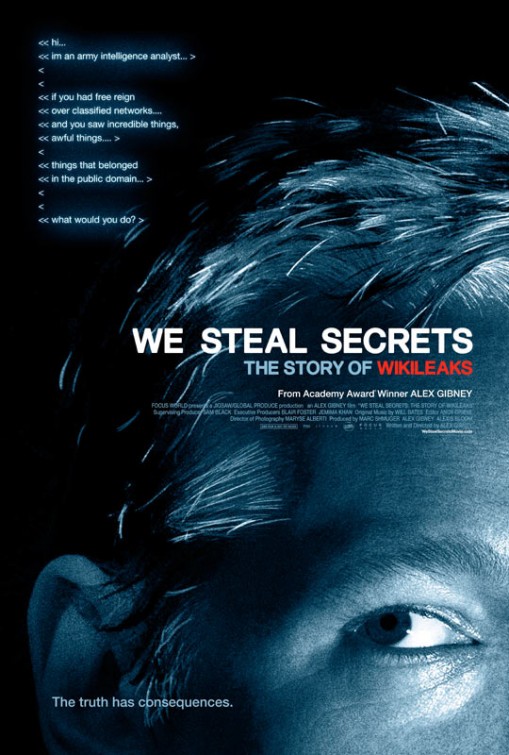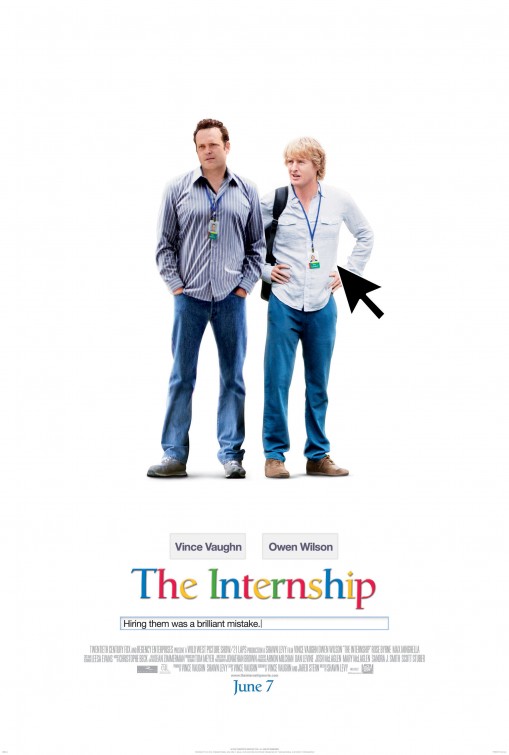We live in a world of wonders, where all of the problems that plagued humanity from the dawn of time until now have been solved through the miracle of modern invention and technology.
We live in a prison of reduced privacy, where our governments hold secrets from us and gather secrets about us, thanks to the powers granted to them through modern invention and technology.
While the reality of the current state of our universe is far more complex than such a simplistic and reductive dichotomy would indicate, these opposing viewpoints seem to be the poles between which much of the general public’s opinion fluctuates, and are reflected in a recent article in The New Yorker about Silicon Valley, and a recent opinion piece in The New York Times by Julian Assange, founder of WikiLeaks.
In this climate of uncertainty about our feelings on the ubiquity of technology, two films opened this weekend that offer different takes on the role that this technology plays in our lives: We Steal Secrets: The Story of WikiLeaks, a documentary by Alex Gibney; and The Internship, a comedy by Shawn Levy (co-written and developed by its star, Vince Vaughn).
We Steal Secrets: The Story of WikiLeaks (Alex Gibney, 2013)
Alex Gibney, a prolific director of often hard-hitting and comprehensive documentaries, is perhaps best known for Enron: The Smartest Guys in the Room – which examined the rise and fall of the once all-powerful corporation of the title – and his Oscar-winning Taxi to the Dark Side – which examined the role that torture has played in the U.S. war on terror. If you’ve seen any of his films – and there are many – then you know that he is an excellent journalist, committed to seeing all sides of an issue. No one is without ideology, and there is no such thing as pure objectivity (as an Al-Jazeera producer says in another great documentary – not directed by Gibney – Control Room), but any film that refuses to see anyone as all bad or all good – that, in fact, even rejects a simplistic notion of “good” and “bad” – and that strives to see the humanity in all of its participants, is the kind of documentary that always wins me over. It’s one of the reasons I liked The Queen of Versailles so much: I thought the protagonists were ridiculous in many ways, but I also recognized that they were human, and therefore worth spending time with.
We Steal Secrets tells the story of WikiLeaks – a website devoted to publishing leaked information about governments and corporations in the interest of openness and transparency – and its founder, Julian Assange, as well as that of Private Bradley Manning, the man responsible for leaking secret U.S. government documents about Afghanistan and Iraq (and beyond) to that site. If you haven’t followed Assange’s story over the past few years, he is currently holed up in the Ecuadorian embassy in London, where he took refuge to avoid extradition to Sweden for a potential sex crimes trial. Manning, under military arrest since 2010, is now on trial for his actions. Gibney’s film is, one can say, extremely topical at this particular point in time.
Most of Gibney’s work focuses on the consequences of hubris. Whether he is examining the actions of Eliot Spitzer, the shady dealings of Jack Abramoff, or the unethical/illegal behavior of Enron executives, Gibney is fascinated with powerful people who begin to believe that the rules simply don’t apply to them. In Assange, he has found another such clueless egomaniac. It wouldn’t be an interesting film, however, if that were all there were to Assange. In fact, the idealism behind the founding of WikiLeaks and much of what Assange has accomplished in his life is admirable (to me, anyway). As someone who has spent a lot of time studying the former Soviet Union, as well as the Hollywood Blacklist, I am particularly wary of governmental opacity and secrets, and ascribe to the philosophy espoused by the main character in V for Vendetta: “People should not be afraid of their governments. Governments should be afraid of their people.” Granted, I have no desire to blow up the houses of Parliament, as “V” does in that film, but I do believe in what Abraham Lincoln called “government of the people, by the people, for the people,” and not the reverse. So if we look at what our government is doing and don’t like it, I’m all for exposing its secrets (up to a point). National security interests should come in to play, and the film does talk about those, and you, dear reader, can decide where you stand on the issue.
What We Steal Secrets does extremely well, then, is explain how Assange started, and how he used his knowledge of technology (he was a hacker in his youth) to achieve his goals.
But it’s not just about Assange, and the portions of the film that look at Private Manning were the most moving and disturbing to me. How such an obviously unhappy and unstable individual could remain in the military for so long – with access to classified files – is a mystery, and for those who are angry with him for leaking secrets in the first place, you have to ask yourself about an institution that claims awesome security powers, yet protects them so poorly.
Using simple graphics – the best I’ve seen for representations of emails and online chats – Gibney shows how Manning reached out to others, especially a fellow hacker, Adrian Lamo (who eventually turned him in), to tell his story. It’s all very sad, and human, and reveals how even the most savvy tech people can be incredibly stupid, themselves, when it comes to their own privacy.
By the end of the film, we emerge from this tale of idealism gone wrong, of secrets published and lives ruined, feeling paranoid about privacy and governmental overreach, but also profoundly affected by the idealism of some of the film’s main characters, and maybe a little hopeful that good journalists still exist in the world . . . for now.
The Internship (Shawn Levy, 2013)
Speaking of great graphics, one of my favorite parts of The Internship was the end title sequence (sadly, I can’t find who created it in the “full cast and crew” listing on imdb), in which the various cast and crew names are displayed in very clever adaptations of the standard Google designs. I feel like I should watch the movie over again just to see the end credits once more. Perhaps I’ll wait for the DVD/Blu-Ray/Netflix, etc., release . . .
It’s not that I didn’t enjoy the film – full confession, I did laugh out loud in many places – but that it’s pretty dumb, predictable, an obvious infomercial for Google, and actually pretty offensive in its portrayal of women. I know, what did I expect, given Vince Vaughn’s track record, right? Still, in 2013, I am still surprised that a big studio release would content itself with so little. Then again, I laughed. Out loud. So what am I complaining about?
The Internship follows Vince Vaughn and Owen Wilson – last paired in another dumb and (slightly less) offensive movie that also made me laugh out loud, Wedding Crashers – as 40-something high-end watch salesmen who lose their jobs when their company folds, find themselves without relevant skills in our modern digital world, decide they want to work at Google, and somehow land slots in a competitive internship program at that company. What follows is a two-hour romp that unabashedly celebrates the miracles that Google hath wrought, is working, and will work in the future, while also treating us to the usual heavy drinking, strip clubs and fish-out-of-water scenarios that we often expect in these frat-boy type of comedies. Somehow, Vaughn and Wilson’s characters have managed to avoid having much – if any – exposure to either computers or contemporary popular culture prior to their arrival at Google, a fact which fuels much of the comedy but is also mildly insulting to the legions of 40+year-olds on the planet who work with technology and pop culture every day. My favorite use of such cluelessness – one of those laugh-out-loud moments – is when they find themselves playing Quidditch with their fellow interns, having no idea what they’re doing. Ha!
Along the road to their ultimate success (which really isn’t a spoiler alert), Vaughn and Wilson mentor their younger trainees, teach lessons to their Google superiors, and defeat rivals who just don’t get “Googliness.” Once their goals achieved, they prepare for the wonderful life ahead of them, having mastered HTML5 and the ins and outs of all Google apps. Some reviewers – such as Manohla Dargis in The New York Times and Stephen Rea of The Philadelphia Inquirer, to name a few – were quite bothered by the complete lack of irony in the corporate endorsement of Google on display. Perhaps they just don’t get “Googliness” and should go hang out in a strip club, get drunk and then play Quidditch. Or maybe they have a point . . .
However you feel about it, you probably won’t feel paranoid that your government is coming to get you. Then again, maybe one day soon the lines between Google and government will be truly blurred, and then we’ll see whether we’re ready for that algorithm.



8 Comments